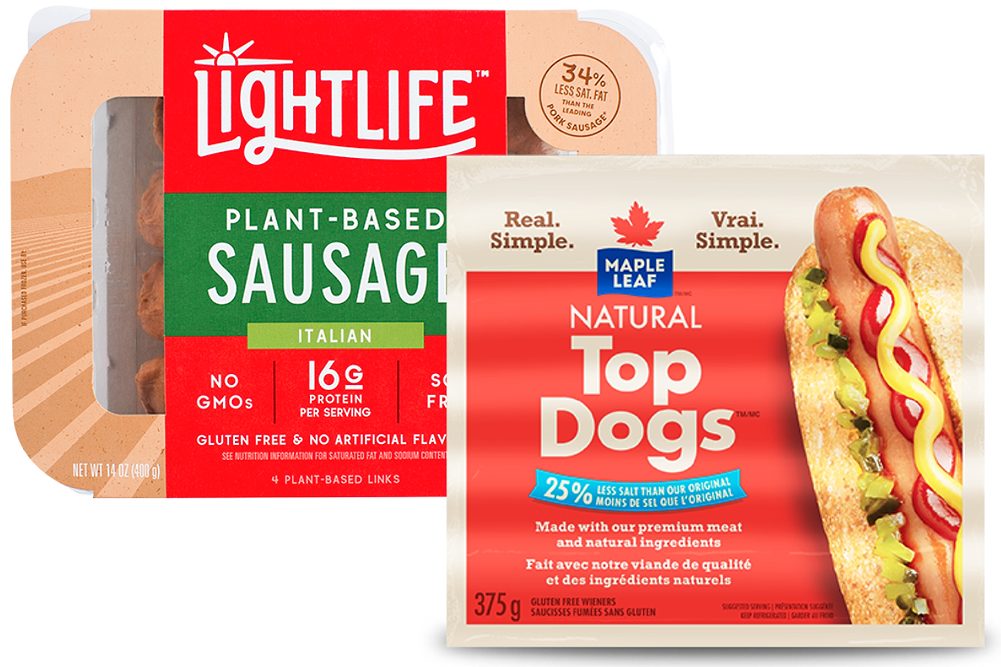TORONTO — Favorable price, mix and volume in Maple Leaf Foods, Inc.’s animal protein business drove top-line growth during fiscal 2019, ended Dec. 31. Sales of plant-based products rose 24% during the year and management said it will continue to invest in the growth and expansion of the business.
Fiscal 2019 net income fell to C$74.63 million ($55.87 million), equal to C$0.60 per share on the common stock, from C$101.35 million, equal to C$0.79 per share the year prior. Earnings were impacted by a C$12.1 million non-cash change in the value of some assets and derivative contracts, according to the company.
Fiscal year sales rose to C$3.94 billion ($2.95 billion) from C$3.50 billion the year prior.
Meat Protein Group sales rose to C$3.78 billion from C$3.36 billion in fiscal 2018. Business unit gross profit rose C$50 million to C$568 million.
“Strong results in our meat protein group was the culmination of momentum that developed throughout the year,” said Michael H. McCain, president and chief executive officer, during a Feb. 27 conference call with analysts. “Performance was particularly impressive given the obstacles that it overcame during the past year, largely related to global trade disputes, including China's four month suspension of Canadian pork imports and the short-term negative impact of the global outbreak of African swine fever, both of which impacted this segment's margins.”
Plant Protein Group sales rose to C$176.4 million from C$138.6 million the year prior. Gross profit dipped slightly to C$35 million from C$38.8 million in fiscal 2018.
“New disruptive food categories typically follow a predictable path, moving from early adoption to take off to maturity over a period of five or more years,” Mr. McCain said. “We've seen this in the plant-based milk category, in the Greek yogurt category, energy drinks, to name a few.
“Plant-based protein is currently what we would describe in the takeoff phase, where household penetration builds as mass market adoption becomes the focus, and mass market outlets such as grocery stores become the primary sales channel.
“Recent IRI data reinforces that plant-based protein will be an increasingly core part of diets in North America and around the world. We're confident that we can build this into a $3 billion business by 2029, which means capturing a conservative, low double-digit percentage share of an estimated $25 billion market in that time frame.”
Maple Leaf’s plant-based products are currently sold in 12,000 retail locations in North America, according to the company, and its Lightlife burger and sausage applications hold a No. 2 position in the market, according to IRI/Spins data.
“Already this year, we launched our plant-based breakfast portfolio, consisting of raw sausage patties and links,” Mr. McCain said. “And while it's early days, we're super excited about this expansion to new breakfast options and further innovation that we have in store for 2020. Innovation also requires strategic investments to establish these beachhead positions in other plant-based protein alternatives like seafood.”
The company announced a C$5 million investment in Good Catch in January, a US-based plant-based seafood manufacturer. The startup manufactures and markets a variety of plant-based tuna, burger and crab cake applications.
In fiscal 2020, Maple Leaf Foods management expects to deliver mid- to high- single digit sales growth coming from higher sales to Asia.
“The outlook in the Meat Protein Group is based on assumptions with respect to two dynamics within the global pork complex: African swine fever and the outbreak of COVID-19,” said Geert Verellen, chief financial officer. “On ASF, we continue to believe the pork shortfall in China will create a strategic opportunity for Maple Leaf while driving up pork prices globally. On COVID-19, the situation continues to evolve. And while we have observed some pork delays related to our shipments to Asia, we haven't seen any signs that cause us concern.”
Management expects the Plant Protein Group to generate sales growth of approximately 30% in 2020.
“Our growth is not expected to be linear, as we expect Q1 growth to lower our 30% target, with the balance of the year seeing higher growth as we continue to expand distribution points and launch new products,” Mr. Verellen said. “We expect growth to be driven by continued new product innovation, brand renovation in both our Lightlife and Field Roast brands, growth in food service and underlying market growth. We expect planned gross margin to expand relative to 2019, as the business continues to grow and we optimize operational efficiencies and minimize start-up costs.”
Selling, general and administrative expenses related to the Plant Protein Group are expected to be approximately $150 million. It will include advertising, promotion, marketing and research and development to drive innovation.




